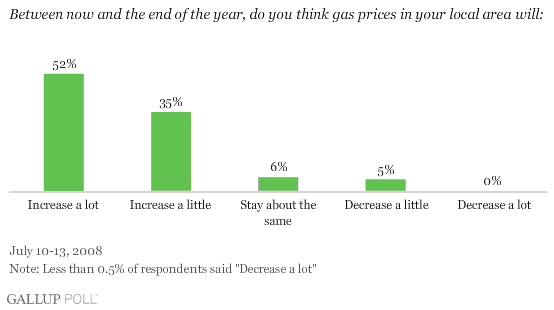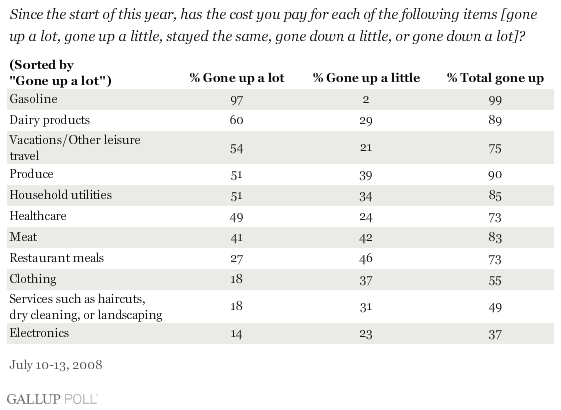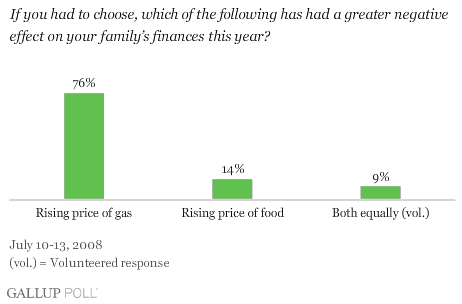PRINCETON, NJ -- Americans overwhelmingly believe that gas prices in their local areas will increase by the end of the year, and a majority of 52% believe prices will increase "a lot."

Some observers may hope gas prices will settle back down after Labor Day this year, but that hope is not widely shared by average Americans, among whom pessimism about gas prices reigns supreme. These data suggest that to the degree that consumer purchasing behavior is controlled by beliefs about the future, one should probably not expect a significant uptick in consumer spending in the weeks ahead.
There has been recent discussion that in addition to the sharp rise in the price of gas, the cost of many other products and services has gone up as well. Responses to a question asking Americans about the relative cost they pay for a list of items shows that while gas is clearly at the top of the list, the public is keenly aware that it is paying more for a number of other products and services.

Not shockingly, almost all Americans -- 97% -- say the price they pay for gas has gone up a lot since the beginning of the year. But 60% say the price of dairy products has gone up a lot, 54% say this about vacations and leisure travel, and 51% about produce and household utilities. Less than half say the cost of the other items has gone up a lot since the beginning of the year, with "electronics" at the bottom of the list.
Still, a majority of Americans say the cost of all but two items on the list (the two being electronics and services such as haircuts, dry cleaning, or landscaping) has gone up at least a little.
When Americans are asked whether rising gas prices or rising food prices have had the greater negative effect on their personal finances, they give the nod to gas prices, by more than a 5-to-1 margin.

This finding reinforces the basic fact that as far as inflation is concerned, Americans see the world as "gas first," with all other costs falling significantly behind.
Bottom Line
Americans are deeply pessimistic about the trajectory of gas prices over the next six months, with the vast majority saying they will continue to go up rather than stabilizing or getting lower. Americans furthermore are more likely to perceive that gas prices have gone up a lot since the start of the year than they are to perceive this about any other product or service on the list, including food. Given a choice, Americans are much more likely to say the rising price of gas, rather than the rising price of food, has affected their finances negatively. All of this suggests not only that Americans don't see a light at the end of the gas price tunnel, but also that they view the run-up in gas prices as the most significant inflationary pressure they face.
Survey Methods
Results are based on telephone interviews with 1,016 national adults, aged 18 and older, conducted July 10-13, 2008. For results based on the total sample of national adults, one can say with 95% confidence that the maximum margin of sampling error is ±3 percentage points.
Interviews are conducted with respondents on land-line telephones (for respondents with a land-line telephone) and cellular phones (for respondents who are cell-phone only).
In addition to sampling error, question wording and practical difficulties in conducting surveys can introduce error or bias into the findings of public opinion polls.
To provide feedback or suggestions about how to improve Gallup.com, please e-mail feedback@gallup.com.
